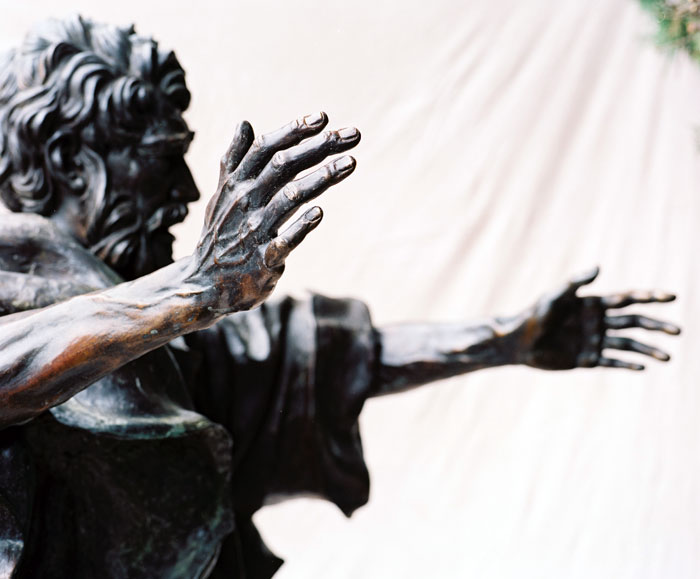 by Fr. Patrick Henry Reardon
by Fr. Patrick Henry Reardon
After the Apostle Peter was released from prison, we read,
“he departed and went to another place” (Acts 12:17).
The evidence indicates that Peter, before his life was over, went to several other places. Some time later we find him, for example, at Antioch (Galatians 2:11).
Since Luke traveled mainly in the company of Paul, the Acts of the Apostles tells little about Peter in the ensuing years; so his whereabouts are not easy to pin down. The task is far from hopeless, however. We know Peter was martyred in Rome (A.D. 64), and we are able to garner some idea of the places he visited during those years between Antioch and Rome.
For instance, it is a fact that some of the Christians at Corinth, in the spring of A.D. 55, were boasting of a special loyalty to the Apostle Peter (1 Corinthians 1:12). Had Peter visited Corinth? This hypothesis would best account for that boast, surely, but it is also evident that Peter was no longer at Corinth at the time Paul wrote.
More promising to our purpose is the list of regions to which Peter referred at the beginning of his First Epistle:
“Pontus, Galatia, Cappadocia, Asia, and Bithynia.”
Peter wrote his circular letter (“encyclical”) to the churches in these extensive regions for the same reason the Apostle Paul wrote to the Christians at Philippi, Thassaloniki, and Corinth; namely, to extend and consolidate his foundational preaching to those congregations (cf. Eusebius, Church History 3.1).
Special circumstances attended Peter’s ministry in those five regions:
First, it appears that Peter’s ministry—notwithstanding his experience at Caesarea (Acts 10)—was chiefly directed to Jews (cf. Galatians 2:7). From Philo (Legation 36) we know that Jews were settled in Bithynia. When the Holy Spirit prohibited Paul and his missionary team from preaching in Bithynia (Acts 16:7), the prohibition evidently intended to leave that territory to the ministry of Peter.
Second, we know that all five of the regions listed by Peter were re-colonized during the reign of Claudius (41-54). The Roman government granted homesteads and other inducements to attract settlers. New cities were founded there, and new roads constructed. Doubtless, many of Peter’s converts came from that group.
Many of the settlers, we are certain, were Jews from Rome; this was the same Claudius, after all, who expelled the Jews from the capital in A.D. 49 (cf. Acts 18:2; Suetonius, Lives “Claudius” 25.4). Those expelled now had the chance for new lives in new homes.
Social studies of religion report on a correlation between movement to new surroundings and a disposition to adopt a new “world view,” including a fresh religious perspective, and successful missionaries have long commented on the advantage of preaching to people who have recently settled in new locations; they seem more open to a “new” message. Whether or not the Apostle Peter sensed that phenomenon, it appears his ministry may have profited from it; some of the most significant Church Fathers came from regions evangelized by Peter.
When, in the early 60s, Peter finally arrived at Rome, he brought with him an abiding solicitude for the other churches he had founded; this is evident in the two epistles that bear his name.
It appears to me, moreover, that Peter may have effected something further with respect to those churches; to the men who succeeded him in the pastoral office at Rome, Peter apparently bequeathed some sense that they, too, were the heirs of his wider concern. Peter “deposited” that concern, so to speak, in the pastoral oversight of what proved to be his final church—the church at Rome.
This suggestion would explain why, near the end of the century, Clement of Rome, who inherited the pastoral ministry of Peter (and Paul—cf. Irenaeus of Lyons, Against the Heresies 3.3.2), felt responsible for the spiritual welfare of the Christians at Corinth; the latter, even at that late date, were still engaged in the local dissensions which had blighted that church even when the Apostles labored there.
In response to that situation, Clement, following the example set by Peter, sent them a letter of pastoral exhortation. This work was much appreciated by those who appealed to the authority of the Apostles (cf. Irenaeus, op. cit. 3.3.3; Clement of Alexandria, Stromateis 4.17).
